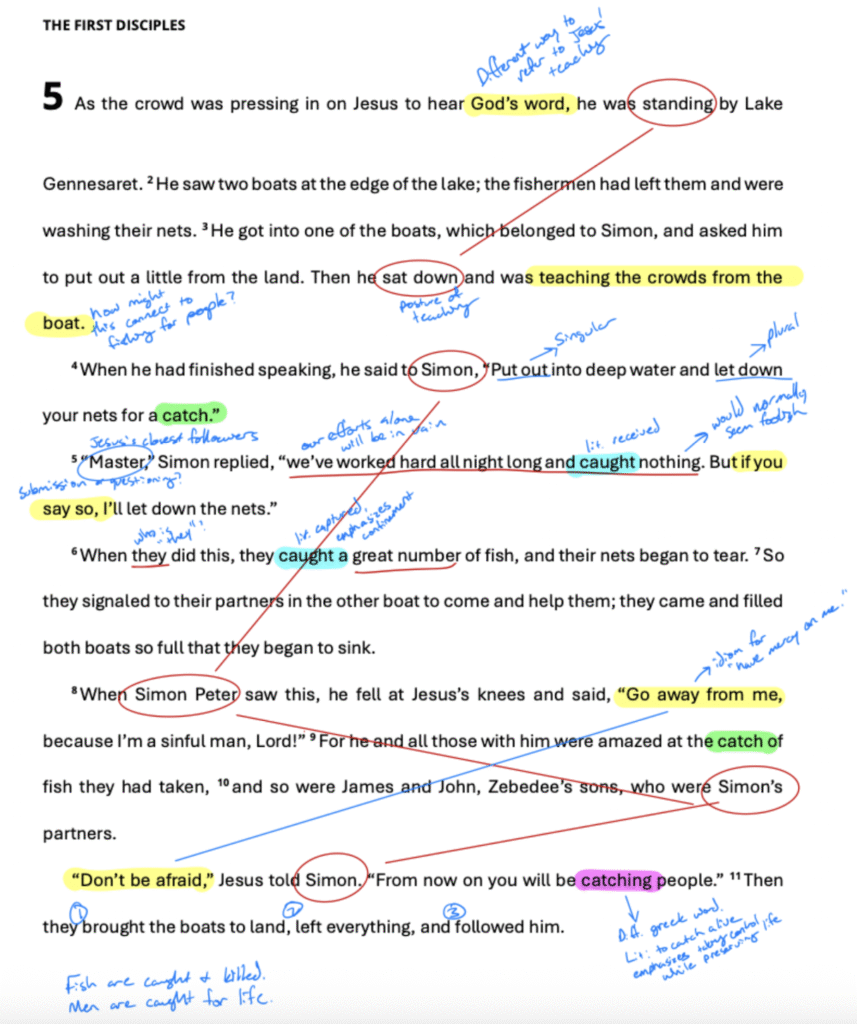
If you’ve ever found yourself wondering how you can get more out of your daily Bible reading, here are some practical ideas that aren’t difficult to use. Some on this list may be simple or obvious, but there may be some you haven’t considered.
PRAY
Before you read, stop and pray. Pray for God to speak to you, to give you an understanding of what you read, and to help you apply and obey what you understand. Praying opens the lines of communication between us and God.
Journaling
As you read and pray, you can keep a notebook to write down your thoughts and ways you see God wants to use His Word to change you. Sometimes writing something down helps you remember it better as well.
SLOW DOWN AND ASK QUESTIONS
If you are trying to read a Bible plan and you’re short on time, or playing catch-up, you might read quickly. Reading the Bible at the same pace you’d read any other book can be beneficial at times, but if you really want to learn, there are many things you’ll miss reading at a normal pace.
Say you’re reading a chapter a day. You’re on John 3. You come to John 3:16, and you’ve read or heard the verse seemingly a million times. You’d likely be tempted to skim over it. But what if you were to slow down and ask questions, focusing ONLY on that one verse that day?
“For God loved the world in this way: He gave his one and only Son, so that everyone who believes in him will not perish but have eternal life.”
What does it mean that God loved? How did He show that love? Who is the world? God gave…why is that important? How does “everyone who believes” relate to the world? What does it truly mean to believe? Since God did this, what else could this tell me about God? Since God cares about people in this way, how should I care about people? If I were to live with this type of love toward others, how would my life change?
See how slowing down and asking questions not only helps you think deeply about a verse, but also helps you understand and apply it better? You’re more prepared to live it out. You could spend ten to fifteen minutes on just one verse. Obviously, every verse may not apply as much, but if you slow down and ask questions, you’ll be surprised at how much more you could understand and apply.
COMPARE DIFFERENT TRANSLATIONS
I am grateful we live in an era where we have so many good translations of the Bible to reference and read. While it’s true that many of the translations we have are due to publishing companies dealing with copyright laws, etc., it doesn’t change the fact that they are helpful.
If you’re reading, you’ll want to choose a good translation that’s easy to read. But if you’re studying, it can be helpful to reference three to five different translations, especially if you’re trying to get an understanding of certain words and phrases. Let’s look at 1 John 3:9 for an example. See how comparing these translations could help your understanding:
“Everyone who has been born of God does not sin, because his seed remains in him; he is not able to sin, because he has been born of God.” (CSB)
“No one born of God makes a practice of sinning, for God’s seed abides in him; and he cannot keep on sinning, because he has been born of God.” (ESV)
“No one who is born of God will continue to sin, because God’s seed remains in them; they cannot go on sinning, because they have been born of God.” (NIV)
“Whoever has been born of God does not sin, for His seed remains in him; and he cannot sin, because he has been born of God.” (NKJV)
“Those who have been born into God’s family do not make a practice of sinning, because God’s life is in them. So they can’t keep on sinning, because they are children of God.” (NLT)
See how looking at the different translations can change your understanding of this verse? If you were to only read one of these, what conclusions might you come to?
Part of the reason they are somewhat different is that each translation is created with a different translation philosophy/practice (thought-for-thought versus word-for-word). Each has its pros and cons, but using different translations can be very useful. There are easy ways to do this if you use a Bible app. Many have a translation comparison feature.
In the future, I may write a post on choosing a translation and how translations are made. There are other helpful articles online, if you want to Google them.
USE A COMMENTARY OR STUDY BIBLE
If you’ve ever read something and wondered what it meant, even when comparing other translations, this is where a good commentary or study Bible can be helpful. Both have notes that help you understand the context and cultural implications of what you’re reading. There are concise commentaries for the entire Bible, and there are commentaries with volumes dedicated to each book of the Bible, depending on how deep you want to study. Just go on Google or Amazon and look for something like “Study Bible” or “Bible commentary.”
PRINT OUT A PASSAGE AND MARK IT UP
Finally, if you REALLY want to try to notice things about a particular passage, consider printing it out and marking it up. You can do this however you want, but writing, highlighting, etc. can be great ways to slow down and really notice what’s going on. I like to do this on my iPad with an Apple Pencil. Here’s a recent one I did for Luke 5:

There’s no right or wrong way to do this; it’s just about slowing down to notice as much as you can.
This list isn’t exhaustive, but hopefully these tips will be helpful to you in your study and understanding of the Bible. If you have any to add, feel free to leave yours in the comments below.